Scientific experiment performed by Adhyatma Vishwavidyalay
using Universal Thermo Scanner to examine the Ucchishta Ganapati yadnya
performed at Sanatan ashram by H.H. Rambhauswami from scientific viewpoint
Yadnyas comprise an important part of the Sanatan Vedic Dharma. Holy texts elucidate various yadnyas such as Rajsuya, Ashwamedh, Putrakameshti etc. Some Saints are striving to get society benefited from these yadnyas as described in Holy texts. Due to their tireless efforts the tradition of performing yadnyas is still preserved. H.H. Rambhauswami from Thanjavur, Tamilnadu is a great yogi striving to preserve the tradition of yadnyas. He has undertaken the Divine mission of performing special yadnyas to endow society with worldly and spiritual benefits. On 15.1.2016 He commenced the Uchistha Ganapati yadnya in Goa. In order to study this yadnya from scientific viewpoint, a scientific experiment was conducted using the U.T.S. Given further are its observations and inferences.
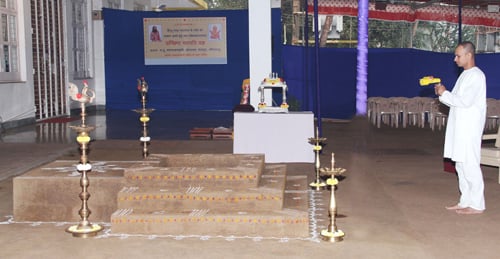
1. Objectives of scientific experiment
Amount of positive vibrations (%) that exists in an element (object, premise, animal and individual), is it sattvik or not, is it spiritually beneficial or not, to explain all this it is necessary to be knowledgeable about subtle. Since Saints understand the subtle they are able to decipher the vibrations in every element accurately. Devotees and seekers accept what is told by Saints with faith. However rationalists do not believe in what Saints say. They seek evidence and believe only if everything is proven scientifically through experiments and with instruments.
2. Nature of the experiment
As part of this experiment, the yadnyakund was examined using U.T.S. before commencing the yadnya and after a day of its completion. Both observations were then compared.
3. Information on the elements of the scientific experiment
3A. Ucchishta Ganapati yadnya
This yadnya was commenced at the Sanatan ashram on 15.1.2016.
3B. Saint H.H. Rambhauswami, the performer of the yadnya
He is a 78 year old Saint hailing from Thanjavur in Tamilnadu and is a great yogi from the lineage of Samarth Ramdasswami.
4. Measuring the aura with the Universal Thermo Scanner
4A. Introduction to the U.T.S.
This instrument is also called an aura scanner and can measure energy levels of an element (object, premises, animals and individual) and its aura. It was invented by Dr. Mannam Murty, a former atomic scientist from Bhagyanagar, Telangana, in 2003 and can be used to overcome obstacles in the vastu (Premises), medicinal science, veterinary medicine and Vedic sciences.
4B. Elements participating in the experiment performed with the instrument and their analysis
4B 1. Negative energy
This energy is deleterious and is of the following 2 types.
A. Infrared light : In this case the infrared light emitted by the element is measured.
B. Ultraviolet light : In this case the ultraviolet rays emitted by the element is measured.
4B 2. Positive energy
This energy is beneficial and in order to be able to measure positive energy, the scanner is set at +ve.
4C. Measuring the aura of the element using a U.T.S.
To measure the aura, that sample of the element which emits most vibrations is selected, for example with respect to an individual his saliva or photograph, with respect to a plant its leaf, with respect to an animal its hair, with respect to a premises the soil and in the context of an Idol of a Deity the sandalwood paste, shendur etc applied to it.
5. Precautions taken to ensure consistency in the experiments
A. The instrument was handled by an individual without any spiritual distress (that is without negative vibrations).
B. To prevent effect of the colour of the clothing on the testing the one conducting the experiment had worn white clothing.
6. Observations and analysis
| Points in analysis | Before commencing the yadnya | After one day of completion of the yadnya |
| Date and time of experiment | 15.1.2015 8 a.m. | 16.1.2015 8 a.m. |
| 1.U.T.S. reading | ||
| 1A. Negative energy | ||
| A1.Infrared | ||
| Angle formed by the scanner | 0 | 0 |
| B. Aura (metres) (Note 1) | Absent | Absent |
| A2.Ultraviolet | ||
| Angle formed by the scanner | 0 | 0 |
| Aura (metres) (Note 1) | Absent | Absent |
| 1B. Positive energy | ||
| B1. Angle formed by the scanner | 90 | 100 |
| B2. Aura (metres) (Note 1) | Absent | Absent |
| 1C. Aura measured in a sample of mud used in the yadnyakund | 1.24 | 2.31 |
6A. Observations made using the Universal Thermo Scanner
Note 1 : If the scanner forms an angle of 180 degrees then the aura of the component can be measured. If the scanner forms a smaller angle then it implies that there is no aura around that component.
6B. Analysis of observations
1. Negative energy was absent in the yadnyakund before commencing the yadnya and also at the end of the first day of its completion.
2. Before commencing the yadnya, the aura of the yadnyakund was 1.24 metres long. After completion of the first day of the yadnya it increased markedly and became 2.31 metres long.
3. The precincts of the Ramnathi Ashram being inherently sattvik, that is positive, there were hardly any differences in the reading taken before commencement of the yadnya and the first day of the yadnya. If yadnyas are performed elsewhere then the difference is significant.
7. Inferences
Through this testing what we realised is that by performing this yadnya there was an increase in positive vibrations in the environment.
– Mr. Rupesh Lakshman Redkar, Maharshi Adhyatma Vishwavidyalay, Goa (16.1.2016)
e-mail : savv.research@gmail.com

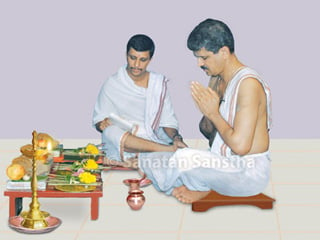 Maharshi Adhyatma Vishwavidyalay conducts novel spiritual research
Maharshi Adhyatma Vishwavidyalay conducts novel spiritual research Unique research explaining the spiritual significance of Vatapournima
Unique research explaining the spiritual significance of Vatapournima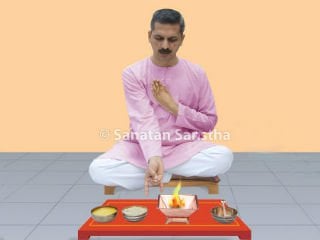 Scientific research on ‘agnihotra’, a precursor of a yadnya (fire sacrifice)
Scientific research on ‘agnihotra’, a precursor of a yadnya (fire sacrifice)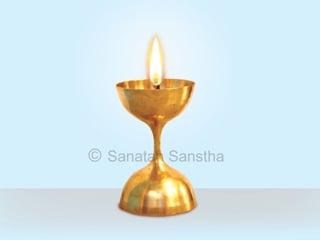 Subtle effects of lighting a plastic lamp with an electric bulb , a wax lamp...
Subtle effects of lighting a plastic lamp with an electric bulb , a wax lamp...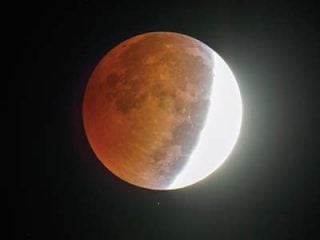 Effects of the eclipse on the states of the Guru, Sadguru and Paratpar Guru
Effects of the eclipse on the states of the Guru, Sadguru and Paratpar Guru Spiritual research using UTS (Universal Thermo Scanner) technology to study the effects at the spiritual...
Spiritual research using UTS (Universal Thermo Scanner) technology to study the effects at the spiritual...